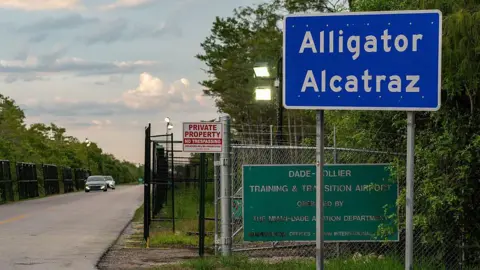The legal battle surrounding immigration enforcement in the United States took a new turn as a Boston judge issued a temporary injunction against the Trump administration's controversial plan to deport migrants to Libya. US District Judge Brian Murphy ruled that such deportations would "clearly violate" prior court orders safeguarding the due process rights of migrants involved in removal proceedings.
This judicial decision follows information from unnamed officials indicating that preparations were underway for deportations to Libya, part of a broader increase in immigration enforcement under the Trump administration. In response to these developments, Libyan Prime Minister Abdul Hamid Dbeibeh publicly rejected the notion of Libya acting as a destination for deported migrants, emphasizing that the country would not accept individuals under any circumstances.
Despite the lack of specific details regarding the number of migrants facing deportation or the intended destinations within Libya, the proposed move could spark significant controversy. Libya has experienced ongoing turmoil and insecurity since the fall of longtime leader Muammar Gaddafi in 2011, marked by civil unrest and competing factions vying for control. The US State Department currently urges American citizens to avoid travel to Libya due to safety concerns.
Immigration attorneys swiftly moved to block the deportations, asserting in court that credible reports suggested imminent flights were being organized to transport migrants. Judge Murphy's ruling reinforced a previous injunction, mandating that migrants receive written notices in their native languages and the opportunity to assert claims against deportation orders.
When asked about the potential deportation plans, President Trump acknowledged his lack of awareness, suggesting inquiries should be directed to the Department of Homeland Security. While Libya is among the nations reportedly being considered for accepting deported migrants, discussions are also underway with other countries such as Rwanda, Benin, and Angola.
This effort forms part of the broader immigration agenda under President Trump, who has adopted aggressive strategies, including financial incentives for unauthorized migrants to exit the US. As the legal proceedings unfold, the implications of this deportation strategy continue to garner concern and scrutiny from advocates and communities alike.
This judicial decision follows information from unnamed officials indicating that preparations were underway for deportations to Libya, part of a broader increase in immigration enforcement under the Trump administration. In response to these developments, Libyan Prime Minister Abdul Hamid Dbeibeh publicly rejected the notion of Libya acting as a destination for deported migrants, emphasizing that the country would not accept individuals under any circumstances.
Despite the lack of specific details regarding the number of migrants facing deportation or the intended destinations within Libya, the proposed move could spark significant controversy. Libya has experienced ongoing turmoil and insecurity since the fall of longtime leader Muammar Gaddafi in 2011, marked by civil unrest and competing factions vying for control. The US State Department currently urges American citizens to avoid travel to Libya due to safety concerns.
Immigration attorneys swiftly moved to block the deportations, asserting in court that credible reports suggested imminent flights were being organized to transport migrants. Judge Murphy's ruling reinforced a previous injunction, mandating that migrants receive written notices in their native languages and the opportunity to assert claims against deportation orders.
When asked about the potential deportation plans, President Trump acknowledged his lack of awareness, suggesting inquiries should be directed to the Department of Homeland Security. While Libya is among the nations reportedly being considered for accepting deported migrants, discussions are also underway with other countries such as Rwanda, Benin, and Angola.
This effort forms part of the broader immigration agenda under President Trump, who has adopted aggressive strategies, including financial incentives for unauthorized migrants to exit the US. As the legal proceedings unfold, the implications of this deportation strategy continue to garner concern and scrutiny from advocates and communities alike.



















